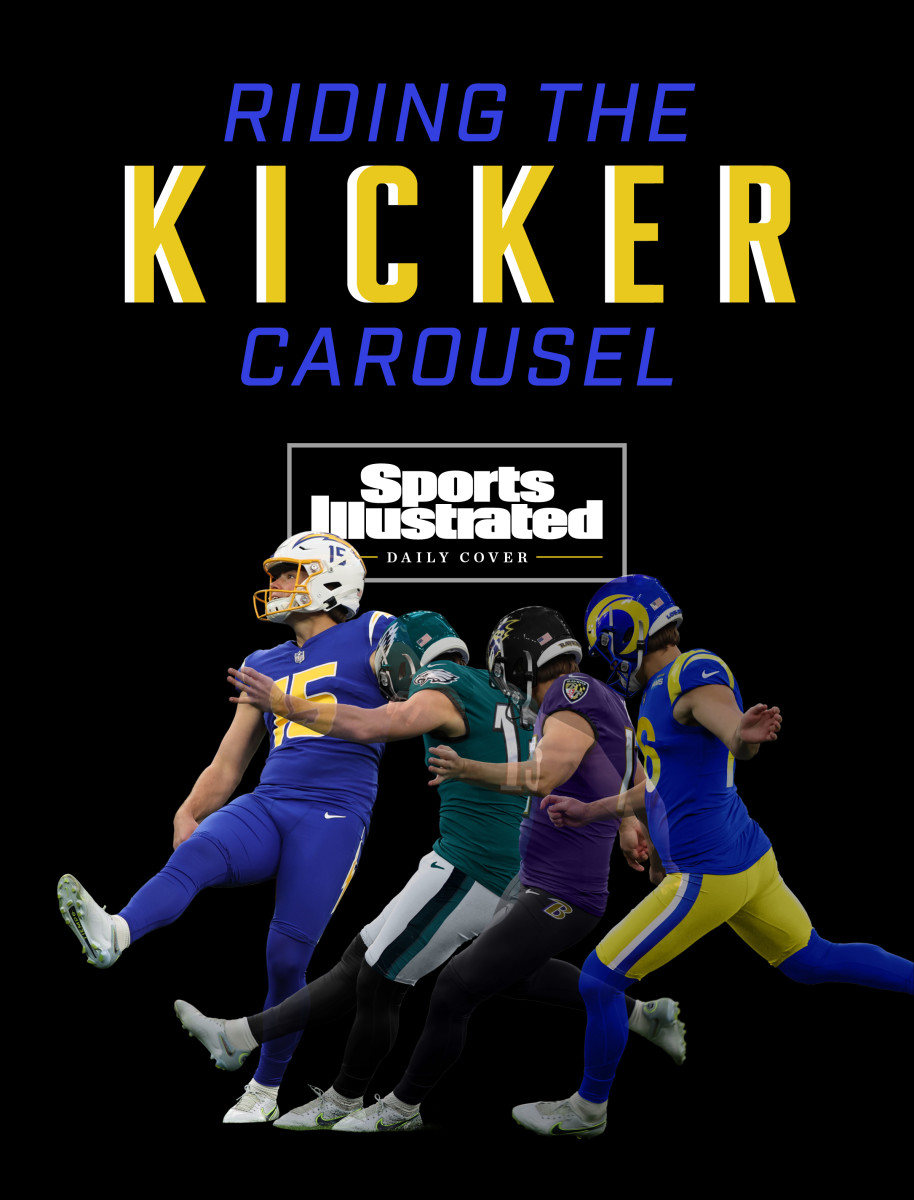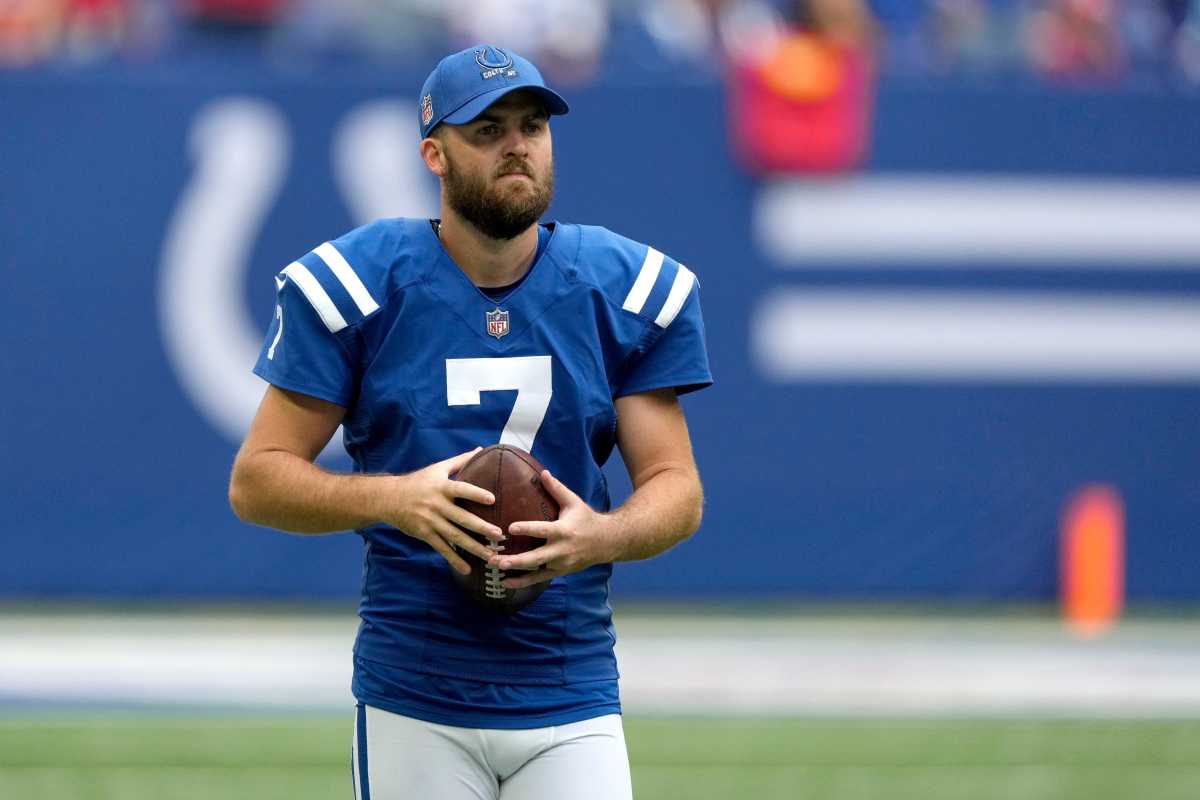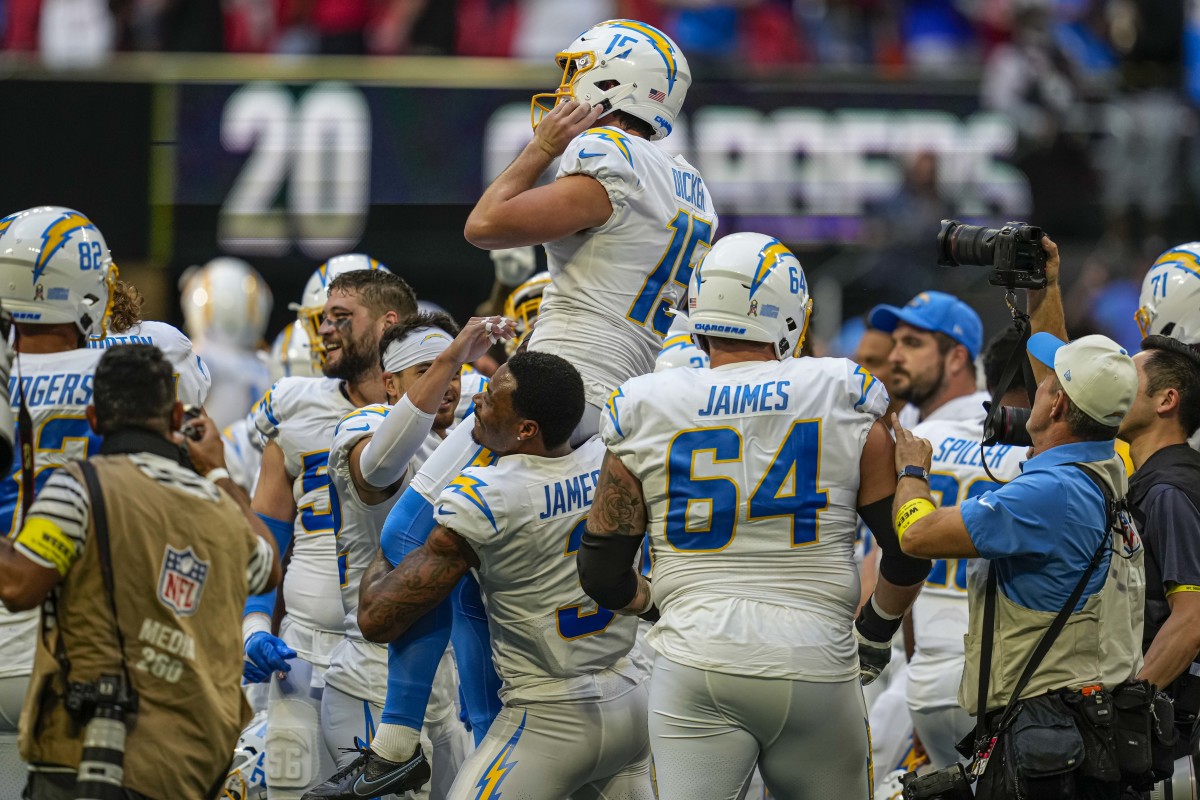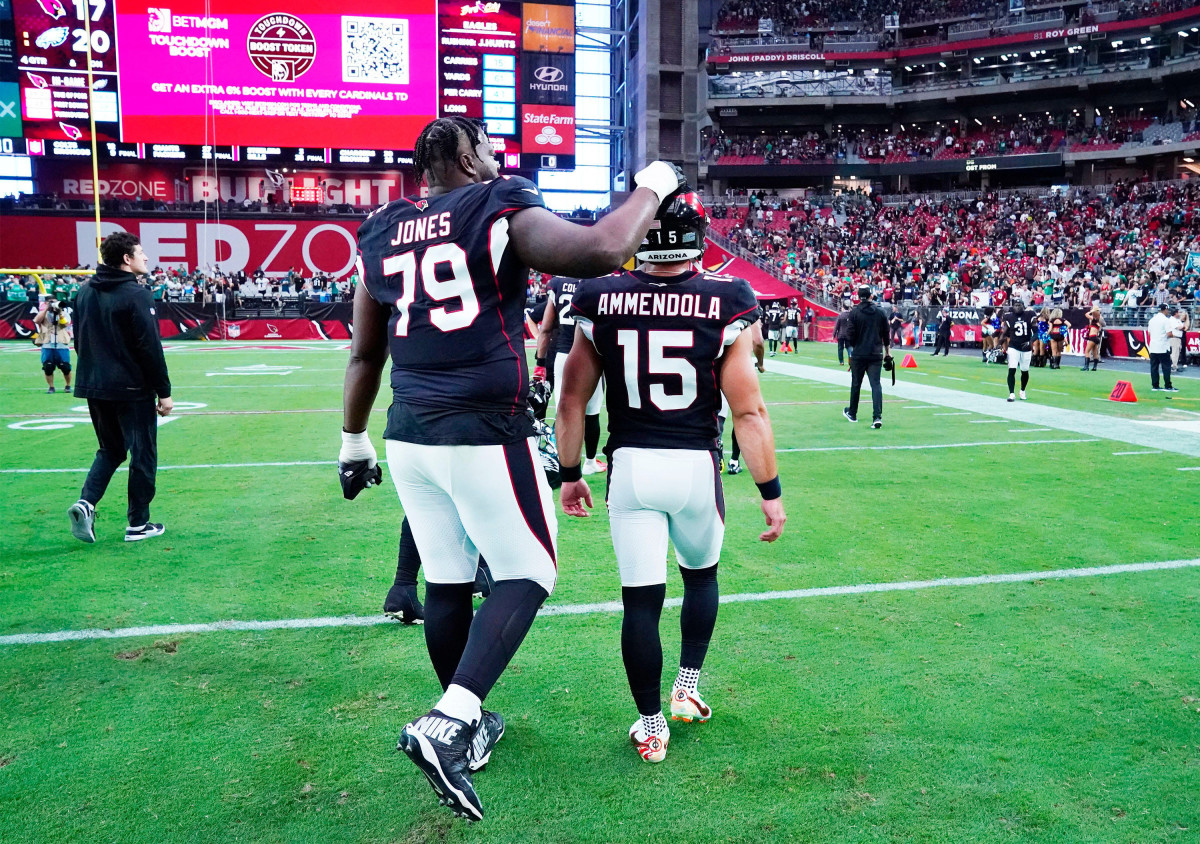‘Definitely a Whirlwind’: Kicking Around the NFL’s Fringes
Seven cities. Eight stints. Twenty months. That was Chase McLaughlin’s first two seasons as an NFL kicker.
First came the Bills, who brought him on as an undrafted free agent in May 2019 and waived him that August. Then the Vikings signed him to their practice squad for all of nine days, cutting him an hour after McLaughlin and his now wife, Jessica, signed an apartment lease. Less than a month later he started a four-game run with the Chargers, then three for the Niners and four more for the Colts, finishing his rookie campaign by signing a contract extension in Indianapolis … only to hit waivers again the following training camp.
Returning to the Vikings’ practice squad for the start of 2020, McLaughlin lasted a full two months in Minnesota this time but still never saw the field. From there he joined the Jaguars’ active roster, replacing the injured Josh Lambo for three games before the Jets claimed him to finish out the season. Between these spells, McLaughlin estimates, he has also traveled to attend tryouts or workouts for “easily a third of the league.” As for the exact total, “I couldn’t even tell you. Lots of keeping the bags packed, lots of living out of hotels, staying ready, that’s for sure.”

Stars like the Ravens’ Justin Tucker and the Packers’ Mason Crosby, who enjoy sustained success and job security in a single city, are outliers, populating the stratosphere of the kicking world. But a large portion of the NFL’s kicking fraternity belongs to a stratum of lesser-known footsloggers for whom the line between opportunity and unemployment is goalpost-thin: Over the past three NFL seasons, of the 63 kickers (excluding emergency fill-ins who play other positions) who have attempted at least one extra point or field goal during that time, nearly 40% of them (25), have done so for multiple teams. And while McLaughlin has found relative stability the past two seasons, spending most of 2021 in Cleveland and joining the Colts—he was still kickin’ in Indy through the end of the regular season—in Week 2 this year, he knows as well as anyone how fast a pink slip can pop up. “The old saying, ‘Everyone wants your job during the week, no one wants it on Sundays,’ is definitely true,” he says.
Turnover is an inevitable reality of life in the NFL, regardless of where a player lines up on the field. But no position experiences ephemerality like kickers, who must perform under immense pressure with the knowledge that each swing of the leg—on average, thus far in 2022, teams are attempting just 4.2 combined field goals and extra points per game, fewest since ‘09—could get them booted to the curb. As a group they have never been steadier, converting 85.0% of field goals (third-highest rate ever) and 94.7% of extra points (best since the distance was moved back in ’15). And yet they have also never been more unsettled: This season, nine clubs used more than one kicker, led by the Titans, Chargers, Chiefs, Steelers and Lions (three each), and the Cardinals (four).
For mercenaries like McLaughlin, their career a bottomless scroll of signings, releases, waivers, claims, active roster elevations, practice squad designations and other transactions, the path to surviving—let alone thriving as a team’s long-term solution—in such a ruthless environment is strewn with contradictions. It requires level-headedness to wait weeks for the phone to ring and urgency to fly off to face a group of peers when it finally does. It takes self-awareness to fit into new locker rooms and self-assuredness to succeed in the spotlight. All told, it demands embracing chaos in a line of work built on routine—snap, hold, kick—just to, as McLaughlin puts it, “stay afloat.”
“It’s definitely a whirlwind,” says free agent Matt Ammendola, who has kicked for the Jets, Chiefs and Cardinals in two years out of Oklahoma State (plus a training camp stint with the Texans this summer that ended after less than three days). “But I feel like it’s what us kickers are programmed to do.”
Welcome aboard the NFL’s kicking carousel. Hold on tight, it’s an up-and-down ride.
As usual, it hardly took long for the carousel to alight and spin again this fall, backed not by old-timey organ music but the more modern soundscape of ringing cellphones. One device belonged to Ammendola, who was hanging out at home in Philadelphia on the first Sunday night of the 2022 season when his agent dialed him with an urgent request. Harrison Butker slipped on a first-quarter kickoff during the Chiefs’ afternoon opener and sprained his left ankle; the team was scrambling to stage a competition for his replacement. How fast could Ammendola get to Kansas City?
A seasoned traveler despite his relative lack of NFL game experience—from May to August, the now 26-year-old flew out for Texans, Cowboys, Packers and Jaguars tryouts—Ammendola already knew to keep his packing list light, as there were no guarantees he would emerge with the gig. “A duffel and a suitcase, enough to make it through the week,” he says. Hustling to the airport the next morning, Ammendola also understood the challenge that awaited him—and whoever else would be jockeying for the same job—upon arrival. “I’ll be real blunt,” he says. “It’s a very awkward situation.”
Picture a stereotypical Hollywood casting call—but, instead of a waiting room of similar-looking actors poring over audition scripts, it is a small group of similarly strong-legged kickers idling curbside outside baggage claim. “Usually a bus or a van will come pick the guys up at the same time,” Ammendola says. “So you’re all in the same [vehicle], either talking or just sitting there.” Any tension here would be plenty understandable, given the stakes. On the contrary, says McLaughlin, “It’s a lot of the same guys going to these, so you get close with them. Everyone who shows up knows what the deal is.”

To start, the deal is that everyone is typically asked to show up on short notice, whether because an injury has happened, a slump has set in, or a front office is simply looking to add someone to its practice squad as a safeguard against one of those two calamities. A few summers ago, Joey Slye was squatting at the gym near his parents’ house in Stafford, Va., staying sharp and saving rent while looking for his first NFL chance out of Virginia Tech, when he was summoned to a workout with the Panthers that he eventually parlayed into two seasons as their starter. “The flight was in like four hours, so I had to rush home, get a shower, and my mom drove me to the airport,” Slye says.
Beyond their destination, though, many details are unclear until the kickers arrive on site. How many others scored invitations? Will the tryout itself take place inside or outside and, if it’s the latter, what will the weather be that day? When will it even start? “It’s different for every single team,” McLaughlin says. “If the coaches are busy, sometimes you’ll have to wait around. Pretty much it’s on their time. Whenever they ask you to kick, you do.” In Kansas City, for instance, Ammendola recalls himself and five fellow kickers, including McLaughlin, passing more than three hours of downtime by eating free lunch at the Chiefs’ practice facility, filling out league-mandated paperwork, and “trying to stay patient.”
The uncertainty carries over to the field, where there is no guessing how many team officials will be on hand to judge their performance. (“When I first signed with the Jets, they had pretty much their whole staff out there,” Ammendola says. “With Kansas City, it was a few personnel people and the special teams coach.”) The same goes for the order in which the kickers line up. (“It could be alphabetical or veteran status; it all depends on what they want,” Ammendola says.) Nor are candidates told beforehand whether the workout will be conducted “live,” featuring an actual long snapper and a holder, or “off the sticks,” with the ball teed up by a kicking stand.
At least the workouts themselves tend to follow similar formats. “Typically, you hit anywhere from 10 to 15 kicks,” Ammendola says. “Start with extra points, then usually it’s hash-to-hash [field goals] as you continue to back up. Then you hit three to five kickoffs, just to see overall leg talent. Some teams will throw in an extra kick at the end, where you can choose to go from wherever you want, like an extra point again, or a ball you missed.” All told, the whole process whips by fast, generally lasting no more than an hour. “I kind of black out, I’m so focused,” Ammendola says. Even so, it isn’t difficult to discern how everyone has done by the end. As Slye puts it, “You can tell if you’re the guy.”
Such was the case when Slye reported to a workout with the Commanders in November 2021, following three-game stops each with the Texans and 49ers earlier that season, and surprisingly found himself alone. “If I had a good day, it wasn’t like they were gonna sign someone else,” says Slye, who has started for Washington ever since. Other competitions conclude with greater drama, à la a reality show rose ceremony. “Some teams are discreet and bring you aside, but typically they’ll grab one guy and be like, Hey, we’re gonna sign you to the active, or the practice squad,” says Ammendola, who heard a version of these words after successful tryouts in both Kansas City (where he kicked in Weeks 2 and 3 before getting cut) and Arizona (ditto for Weeks 5 and 6). “Then they’ll go up to the other guys while you’re standing right there and say, ‘Unfortunately you didn’t make the team; we appreciate you coming out.’”
In a practical sense, those who are sent back home from the tryout lose little more than time and opportunity, with travel, lodging and meal expenses covered by the clubs. (“I’ve heard about teams giving them a GrubHub or an UberEats card, like, ‘Here’s $75,’” one NFL agent says.) By contrast, the emotional toll of repeated rejection can prove much more difficult to digest as another turn on the carousel looms.
“It’s part of the job you have to embrace—the process and the work you’ve got to put into trying to become the guy,” says Lions kicker Michael Badgley, formerly of the Colts (twice, albeit only once with actual game action), Chargers, Titans, and Bears. “The easy way out would be just to give up and say it’s not going to happen anymore.”
In addition to proudly toting perhaps the easiest chip-shot of a nickname in the history of his position, Cameron Dicker carried certain assumptions with him when he entered the NFL this spring. Dicker the Kicker has since reconsidered. “For me, from the outside looking in, you see all these dudes as superstars; everyone’s making so much money,” he says. “And obviously it’s an awesome, fun lifestyle. But there’s also a lot of moments when you’re like, Dang, is something going to happen?”
Undrafted out of Texas this spring, Dicker quickly joined the Rams as a free agent but got cut after their first preseason game. Next he embarked on a dizzying tryout tour—“I think it was five teams in a week; every day I was flying somewhere new”—that led to a deal with the Ravens on the last Friday in August, an appearance in their exhibition finale that Saturday and his release on Sunday morning. From there he returned home to Austin, where he spent all of September volunteering at his local church and watching NFL games on television. “It was weird to have the time off,” he says.
So it goes when the carousel stops spinning. Just 32 jobs exist, and practice squad spots are rare. But the position’s hyper-specialization—similar to that of their special teams brethren, punters and long snappers—has also created a backlog of capable players itching for an open seat. McLaughlin guesses “there’s at least 7 to 10 guys who aren’t with teams who have the talent.” Brooks Henderson, an agent whose kicker clients include the Falcons’ Younghoe Koo, the Seahawks’ Jason Myers and Ammendola, puts the headcount higher: “Probably 20 [who are] available now. Some guys you may not have heard from in a while. It’s brutal, but that’s part of it.”
Fortunately, if only for the sake of headline writers, it wasn’t long before Dicker the Kicker was kicking again. Signed to the Eagles’ practice squad Oct. 5 after a one-on-one tryout against East Carolina product Jake Verity, Dicker went on to make a sterling NFL debut four days later, striking the decisive 23-yard field goal with 1:48 left in a 20–17 road victory against Arizona in Week 5 as a replacement for injured starter Jake Elliott (right ankle). And while Elliott returned to play in Week 6, knocking Dicker back to the practice squad, the latter managed to hang around through the team’s Week 7 bye, during which he flew back to Austin to fetch his Xbox and some additional clothes.
A predictable cut finally came heading into Philly’s Week 8 game, but Dicker quickly received a practice squad offer from the Chargers—no tryout necessary—the Wednesday before Week 9, as he was getting ready to leave for a Carrie Underwood concert in Austin. Rushing to the airport, Dicker reached his Southern California hotel close to midnight, woke up at 6 a.m. for his medicals and that Sunday afternoon rose to the occasion as an injury replacement for Dustin Hopkins (hamstring), hitting a 37-yard, buzzer-beating field goal to top the Falcons, 20–17, after which two of his new teammates lifted him onto their shoulders and charioted him around the field like a hero. “First time that’s ever happened to me,” Dicker says of celebration. “I didn’t know what to do up there. Just gave a little, Woo!”

Still starting for the playoff-bound Chargers, Dicker is proof that down time doesn’t necessarily spell doom. In fact, many kickers find their footing this way. Prior to starting for the Broncos for six seasons, and then the Lions for another seven, Matt Prater was cut three times in his first two years. Myers, who was recently named to the 2022 Pro Bowl, missed the entirety of what would’ve been his rookie season, in ’14, without a contract, instead finding work with the Arizona Rattlers of the Arena Football League. “It can be financially strapping,” Henderson says. “Some guys are fortunate enough to find a quote-unquote ‘real job’ and have their boss understand that they may have to leave because they got a chance to try out for a team.”
After finishing out last season with the Colts, Badgley never quite got as far as considering other lines of employment, even as he spent all of September on the sidelines, working out with buddies on beaches and fields near his Southern California home. “Mentally I was like, I’m gonna stick through this; something’s going to come,” Badgley recalls. “I bet on myself.”
Finally his bet paid off when he got a call from the Bears on the last Thursday in September, inviting him to a tryout at Halas Hall that Friday. There, Badgley bested a handful of competitors in a live operation—“That was great, separates the men for the boys, for sure,” he says—before replacing injured starter Cairo Santos against the Giants that Sunday, going 4-for-4 on field goals with two extra points in a road win. He was cut Monday when Santos returned; on Tuesday he flew out for another successful workout in Detroit, where he converted 20 of 24 field goals and all 33 PATs while finishing out the season as their starter.
Asked why he stuck with it, through all of the uncertainty, Badgley doesn’t hesitate. “Because I love it,” he replies. “It’s all part of the dream. I never wanted to do anything else.”

As with the number of unemployed kickers, it can be difficult to get a handle on just how many tryouts are held over the course of a given season. Alas, there is no Indeed.com for general managers seeking the services of special teamers. And, besides, the carousel is far from the most eye-catching attraction at the NFL circus: According to players and agents alike, their cottage industry’s most central news source is @KickerCentral, an Instagram account with fewer than 4,500 followers that ritually appends its posts about contracts, cuts and competitions with the reproachful hashtag #kickersarepeopletoo.
Maybe social media commenters need reminding, but at least players tend to be understanding when a free-agent kicker whirls into town mid-season. Ammendola learned as much in the wake of his Arizona debut in Week 5, against Dicker’s Eagles, when he missed a 43-yard, potentially game-tying field goal with 22 seconds left. Not only did offensive lineman Justin Pugh interrupt Ammendola’s postgame media availability to deliver a passionate defense of the kicker, but Ammendola recalls several other Cardinals expressing private sympathy for his situation: “D-linemen, O-linemen, they were like, ‘We can’t imagine what you’re going through right now, what the pressure is like. You’re under a microscope.’”

Then again, Ammendola admits, some gaps are impossible to bridge. “Most kickers don’t really look like the prototypical NFL player, so you stand out like a sore thumb,” he says. And, as any kicker will readily point out, the worst possible thing to do for anyone fortunate enough to have won a tryout and earned a contract (and therefore a reprieve from the carousel) would be to stand out so much that they become expendable. “Don’t make an ass out of yourself in the locker room; don’t look like the outcast that specialists already are,” Slye says. “Guys will like you if you make kicks and don’t have issues.”
Beyond keeping the ass out of assimilation, new kickers have plenty of challenges when it comes to adjusting to their new workplaces. The most critical one involves getting on the same page with the snapper and holder, timing-wise. “At this level, these guys are already so picture perfect,” Badgley says. “Some [kickers] like different things, but I just go, ‘Hey, I trust you guys; I’m ready to go.” Further down the checklist are matters like clothing and housing. “Obviously it’s not ideal, being stuck up in a hotel, washing and wearing the same stuff,” Ammendola says. “But you gotta make the most of it.”
Not that any carousel kicker truly gets comfortable, but they all cope in different ways. Dicker and McLaughlin both cited religion and faith. Ammendola, who tried out for the Titans in mid-November but lost out to the ex-Jaguars kicker Lambo and finished the season on the Packers’ practice squad, reports listening to “a lot of motivational speeches,” specifically those that focus on the idea that “everyone’s going to fail.” He also recently read a book by University of Pennsylvania psychology professor Angela Duckworth, titled Grit: The Power of Passion and Perseverance.
Slye, for his part, simply wants to relish in the thrill of the ride. “I try not to think about it as, If I don’t make this kick, I’m not gonna be employed,” he says. “I try to think about it as just going through my checklist of my steps and getting set. Then I take a deep breath, and once I let it out, I’m in an unconscious state. Everything goes, all the preparation I’ve had before, and that moment is all that matters.”
It’s the moment when the phones stop ringing, when the carousel stops spinning, when the stresses melt away and the one thing left is what they love most. It’s time to kick.
